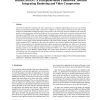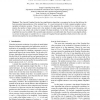326 search results - page 16 / 66 » Perceptual Principles and Computer Graphics |
151
click to vote
PRICAI
2010
Springer
15 years 22 days ago
2010
Springer
Research in learning algorithms and sensor hardware has led to rapid advances in artificial systems over the past decade. However, their performance continues to fall short of the ...
147
click to vote
CGF
2008
15 years 2 months ago
2008
Currently 3D animation rendering and video compression are completely independent processes even if rendered frames are streamed on-the-fly within a client-server platform. In suc...
122
Voted
CVPR
2010
IEEE
15 years 6 months ago
2010
IEEE
In this paper, we present an appearance-based method for person re-identification. It consists in the extraction of features that model three complementary aspects of the human ap...
130
click to vote
MICRO
1999
IEEE
15 years 6 months ago
1999
IEEE
Although PC-class 3D graphics hardware has made significant strides in the last several years, the underlying architectural design principles are still generally considered as a b...
120
click to vote
SIBGRAPI
2003
IEEE
15 years 7 months ago
2003
IEEE
The classical Douglas-Peucker line-simplification algorithm is recognized as the one that delivers the best perceptual representations of the original lines. It is used extensivel...


